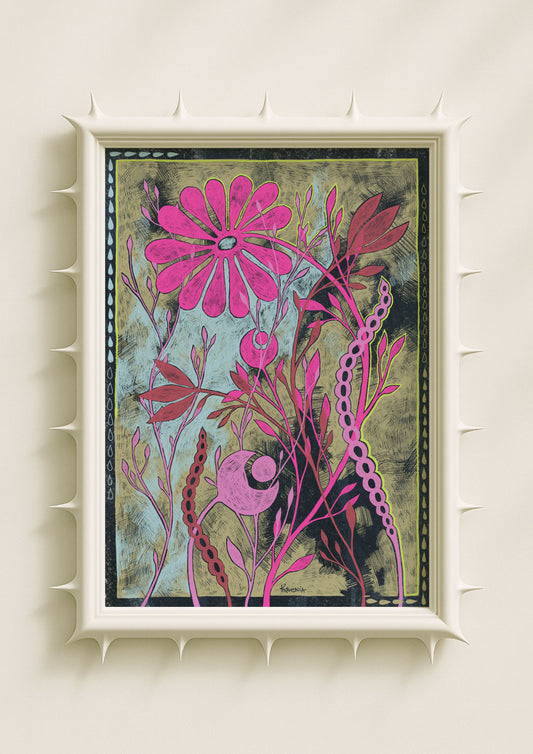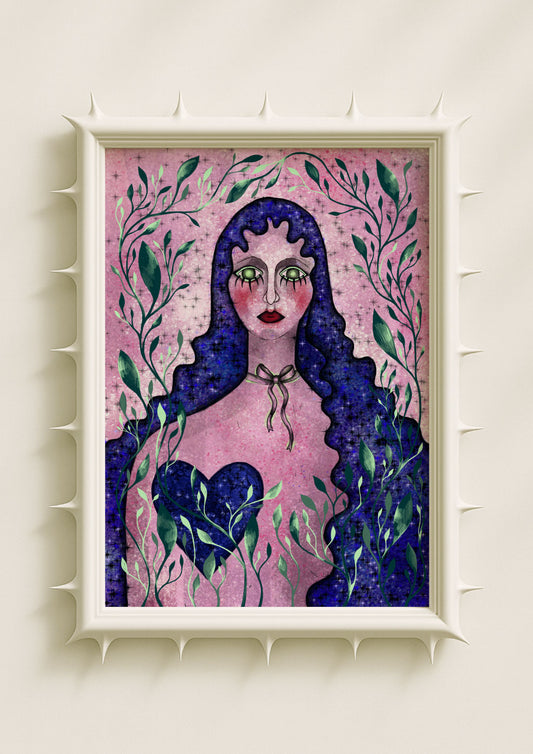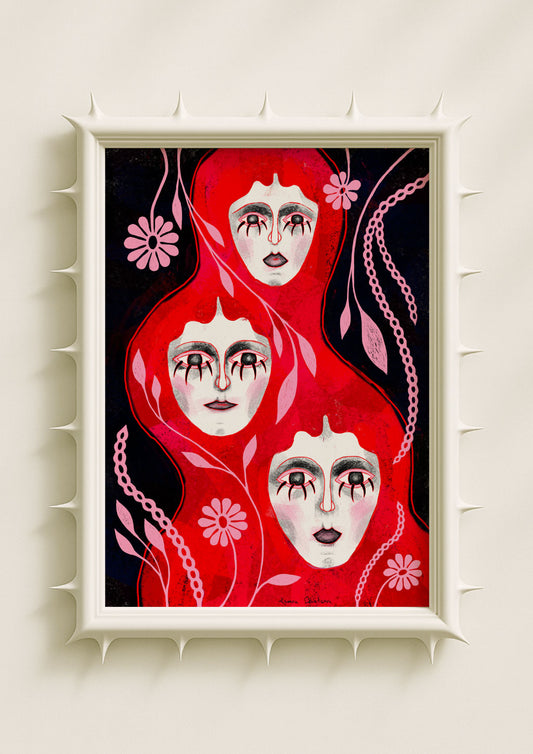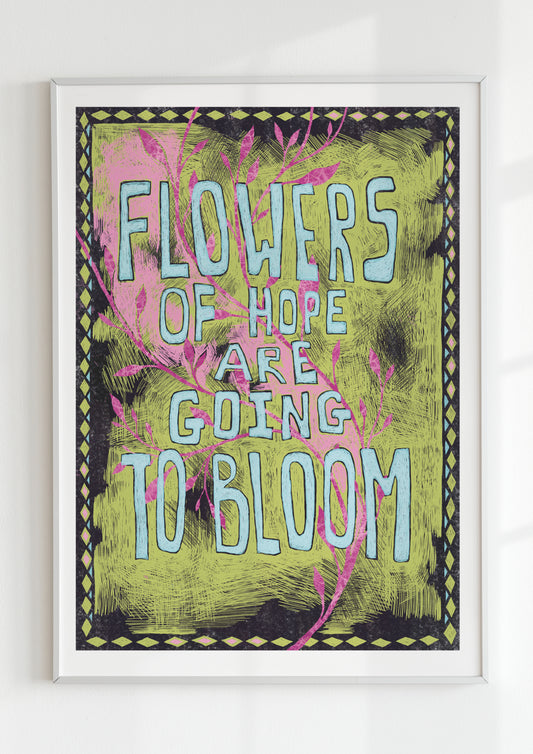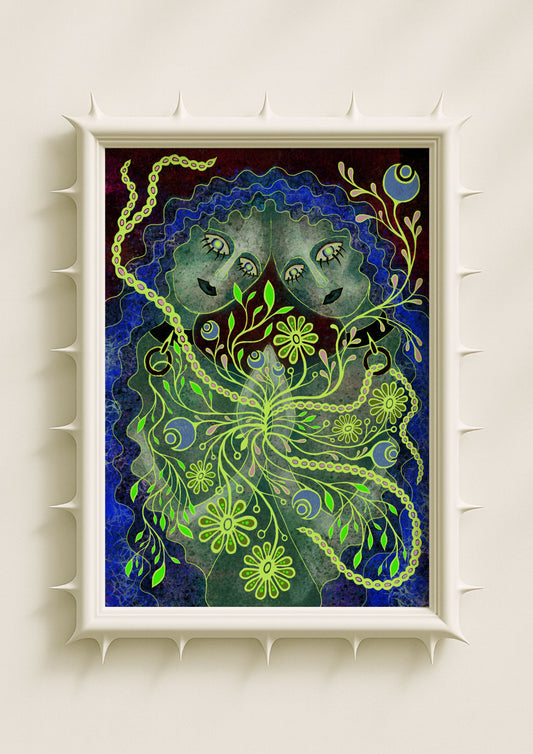Entering a World That Feels Bigger Than the Self
Fantasy begins as an escape, but it rarely stays that way. The moment a viewer enters a mythic world—whether through a creature, a symbolic botanical form, or an atmosphere charged with soft uncanny mood—they encounter something emotionally expansive. Fantasy opens a door to a space larger than daily experience. It shifts perspective, loosens rigid thought, and gives the psyche room to breathe. This expansion is what makes mythic art deeply healing. It creates distance from the immediate, offering a wider emotional landscape where feelings can settle, transform, and reorganize themselves without pressure.

The Soft Uncanny as a Mirror for Inner Change
Fantasy often includes elements that feel slightly strange: a creature with too many eyes, a flower with impossible symmetry, or a landscape that bends in dreamlike ways. This soft uncanny quality has a psychological purpose. It gently destabilizes the familiar, inviting curiosity rather than fear. The viewer senses something unknown but not threatening. This tension between comfort and strangeness mirrors the inner process of growth, where we approach new parts of ourselves with both hesitation and fascination. Soft uncanny imagery helps us recognize that discomfort can coexist with beauty, and that transformation rarely feels entirely stable.
Mythic Worlds as Emotional Language
Folklore and fairy tales have always used symbolic forms—forests, thresholds, serpents, glowing seeds—to speak about emotional reality. These symbols bypass logic and speak directly to intuition. When contemporary fantasy wall art engages with these motifs, it draws the viewer into this language. A twisting plant can reflect rebirth. A hybrid creature may embody vulnerability or courage. A luminous botanical core might symbolize inner warmth returning after a long emotional winter. Mythic imagery becomes a quiet means of communicating complex inner states that words cannot hold easily.

Healing Through Symbolic Distance
Fantasy creates healing not by avoiding emotion, but by offering symbolic distance. When a viewer sees their own tension reflected in a mythical landscape or creature, the recognition is gentler. Instead of confronting a feeling head-on, they experience it through metaphor. This allows emotions to surface without overwhelm. A stormy colour palette may resonate with grief; a soft pink glow may echo renewal; a surreal tangle of shapes may reflect tangled thoughts. The distance created by fantasy makes emotional exploration safer, softer, and more accessible.
Fairy-Tale Logic and the Journey of Becoming
Many of your artworks carry echoes of fairy-tale logic—glowing centres, mirrored shapes, botanical symbols, creatures that hold both fragility and strength. Fairy tales are ultimately stories of becoming. They speak of fear, choice, curiosity, risk, and self-encounter. When viewers enter an artwork shaped by fairy-tale symbolism, they are reminded that growth is a narrative, not a single moment. They recognize their own thresholds, their own forests, their own inner companions. The artwork behaves like a symbolic guide, helping them see their path with clarity and compassion.

Expanding the Emotional Field Through Myth
Mythic imagery expands emotional space by offering multiple layers of meaning. A single artwork can hold innocence and shadow, vulnerability and power, beauty and unease. This multiplicity mirrors the emotional complexity of real life, reminding viewers that no feeling exists in isolation. The artwork becomes a visual field where different emotional frequencies coexist harmoniously. Over time, this layered space helps the viewer integrate parts of themselves they may have held separately—fear with courage, sorrow with hope, stillness with change.
Growth Through Imagination
Imagination is not escapism; it is a psychological muscle that supports healing. When a viewer engages with fantasy art, they activate this inner resource. They imagine themselves inside a mythic world, sensing how they might move, what they might feel, who they might become. This imaginative movement mirrors emotional movement. It loosens inner stagnation and encourages new ways of understanding. Growth becomes less about forcing change and more about allowing new inner worlds to take shape.

Living With Mythic Imagery
When placed within a home, fantasy wall art does more than decorate a space. It continually reopens the emotional field it represents. On some days, it may feel grounding; on others, inspiring or unsettling in a clarifying way. The artwork acts as a companion in growth—quiet, symbolic, and consistently expansive. It holds the viewer’s imagination in motion, offering a gentle reminder that healing often begins with the willingness to step into a world slightly different from one’s own.

